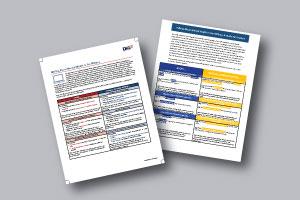By Zoe Andris
May 26, 2020
 PHCoE graphic
PHCoE graphic
Stigma remains a significant barrier to seeking mental health care in the military. While DOD strives to address and reduce stigma through programs and policies, there's a way that we can all do our part to challenge the stigma associated with mental health – through our words.
Language is powerful. The words we use can frame our thoughts and behaviors and can even unintentionally reinforce mental health stigma. When talking or writing about mental health, it's important to choose words that do not judge, mischaracterize, or place blame on service members with mental health concerns. In support of Mental Health Awareness Month this May, PHCoE has created two helpful guides on language "dos and don'ts" when writing or talking about mental health. For a closer look on how to avoid stigmatizing language, let's consider a couple examples.
There are many resources for addicts and alcoholics to receive help in the military.
Even though she's depressed, her suffering doesn't define her.
While the meaning behind these sentences may be well-intended, the words carry stigmatizing, potentially harmful connotations. Let’s break it down.
There are many resources for addicts and alcoholics to receive help in the military.
Words like "addict" and "alcoholic" label service members, as if it's a defining characteristic or trait. These terms also reinforce the stereotype that individuals who engage in substance misuse are doing so willfully. How can we rephrase this sentence to avoid stigmatizing language, while still keeping its intended meaning? Consider this alternative.
There are many resources for individuals with substance use disorder to receive help in the military.
Person-first language is preferred when discussing anyone with a mental health condition or substance use disorder, because it emphasizes that an individual is much more than their experience or diagnosis. Also, using "substance use disorder" rather than "addict" or "alcoholic" clarifies that the condition is a medical disorder, not one of choice or will.
Even though she's depressed, her suffering doesn't define her.
This is another example of labeling language, reducing a person to their condition. Using the word "suffering" is also diminishing, in that it makes an assumption about someone's inner experiences and relationship with their diagnosis. Consider this less stigmatizing option.
Even though she has depression, her experience doesn't define her.
This version keeps the language objective, preventing potential judgement about how depression affects this individual. Removing the labeling language also emphasizes that a mental health condition doesn't define anyone.
For more examples on how to avoid stigmatizing language, download Talking about Mental Health and Writing about Mental Health. While these guides are designed for discussing mental health in a military context, the tips are useful and relevant for all populations. This Mental Health Awareness Month, talk openly about mental health, but be mindful of how you do it. It may seem like a small act, but it can have a big impact on reducing mental health stigma.
Zoe Andris is a public health analyst at the Psychological Health Center of Excellence. She supports the Psychological Health Promotion branch in its prevention and early intervention efforts.